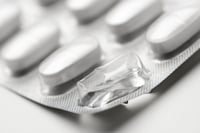Anti-inflammatory Drug May Reduce Heavy Drinking in People With Alcohol Use Disorder

Ibudilast—a drug that suppresses the production of inflammatory molecules in the brain—can significantly reduce heavy drinking in adults with alcohol use disorder (AUD), suggests a small study in Translational Psychiatry.
“A growing body of literature indicates that the neuroimmune system may play a critical role in the development and maintenance of AUD, termed the neuroimmune hypothesis of alcohol addiction,” wrote Erica Grodin, Ph.D., of the University of California, Los Angeles, and colleagues. Both the blood samples and postmortem brain samples of people with AUD have shown elevated biomarkers of inflammation. Other studies have found an association between inflammation and depressed mood, which is also common in people with AUD. “Therefore, a neuroimmune modulator may treat AUD and related negative mood symptoms through similar pathways,” the authors wrote.
The researchers randomly assigned 52 adults aged 21 to 50 with mild to severe AUD (according to the DSM-5 criteria) to receive 50 mg of ibudilast or placebo twice daily over two weeks. The participants were asked to complete daily diary assessments, indicating their past-day alcohol use, alcohol cravings, and mood throughout the trial. The participants also had three in-person visits that included toxicology, blood pressure, and heart rate screenings. At the end of the first week, they also completed an assessment of their reactions to alcohol cues while receiving an MRI scan. The participants in the study were compensated up to $350 for completing the trial.
After two weeks, the researchers found no statistical differences in the number of drinking days or negative mood between the adults taking ibudilast and those taking placebo. However, adults taking ibudilast were 45% less likely to engage in heavy drinking (≥5 drinks/day for men and ≥4 drinks/day for women) during the study compared with adults taking placebo.
The MRI data revealed a potential mechanism of ibudilast’s effects. The participants who took ibudilast had less activity in their ventral striatum in response to alcohol cues compared with those who took placebo.
“[E]xploratory analyses indicated that ventral striatal activation to alcohol cues was predictive of drinking in the week following the neuroimaging scan,” Grodin and colleagues wrote. “These results suggest a biobehavioral mechanism through which ibudilast acts, namely, by reducing the rewarding response to alcohol cues in the brain leading to a reduction in heavy drinking...”
There were no significant differences in the occurrence of gastrointestinal problems or other adverse side effects between the two groups of participants. Grodin and colleagues noted that in addition to showing ibudilast is well tolerated, the side effect data support that the reduction in drinking was not due to the medication making people sick.
To read more on this topic, see the Psychiatric News article “Underage Drinking Declines, But Extreme Binge Drinking Rises.”






